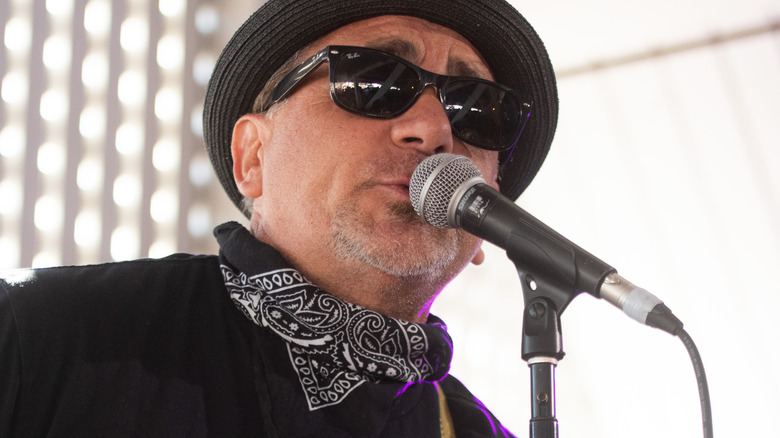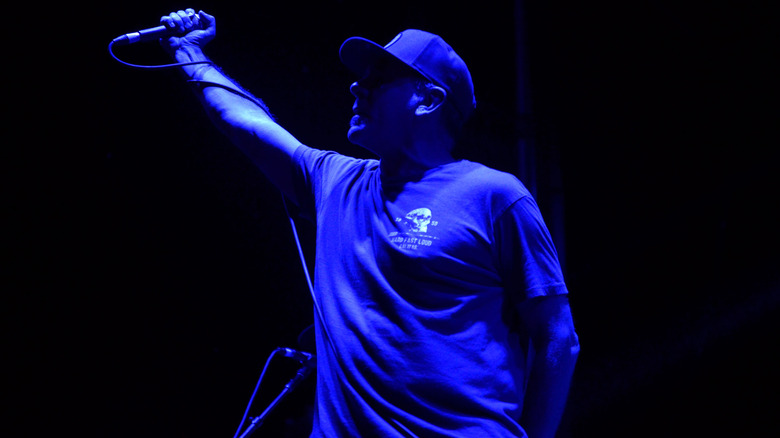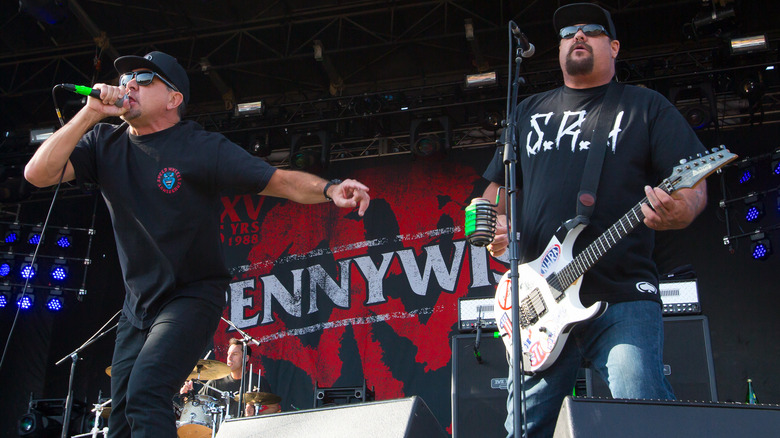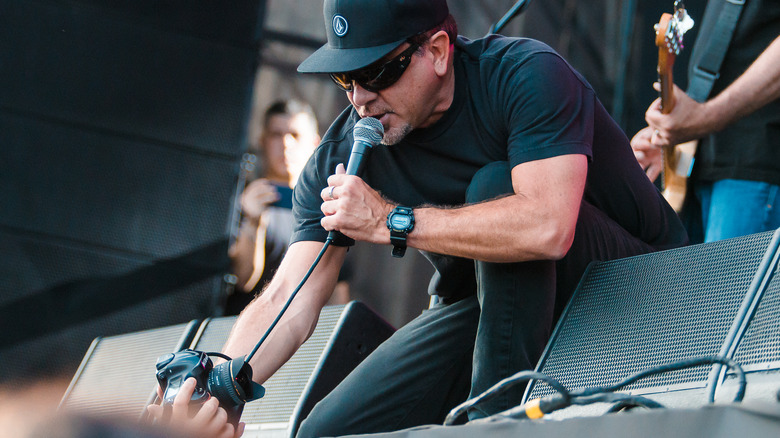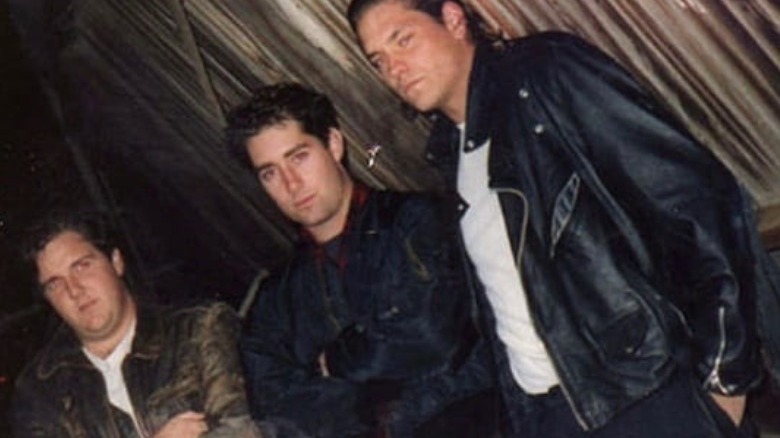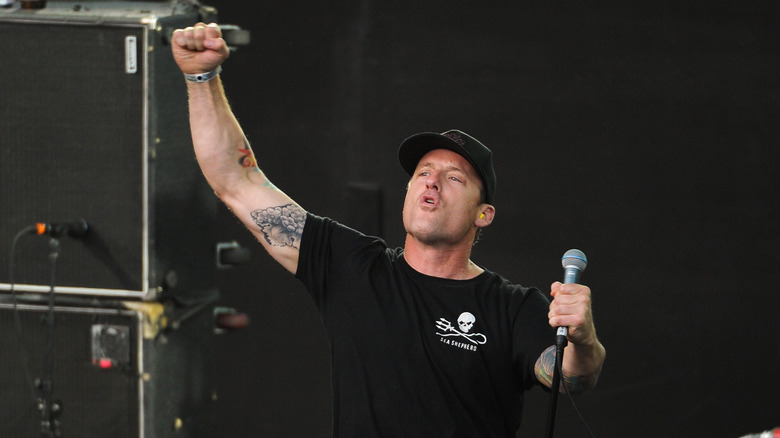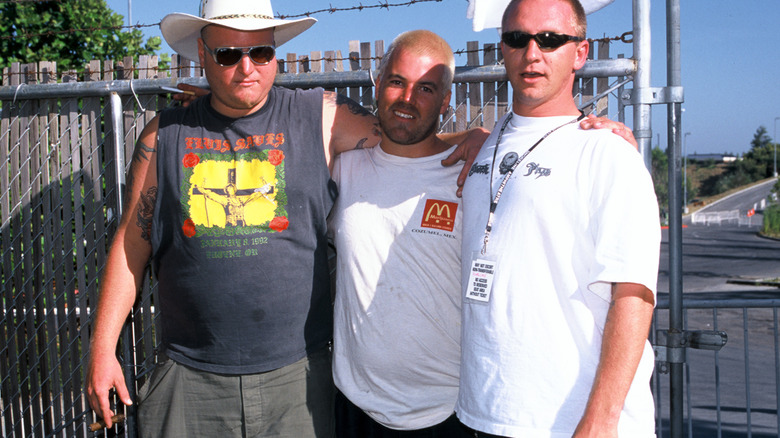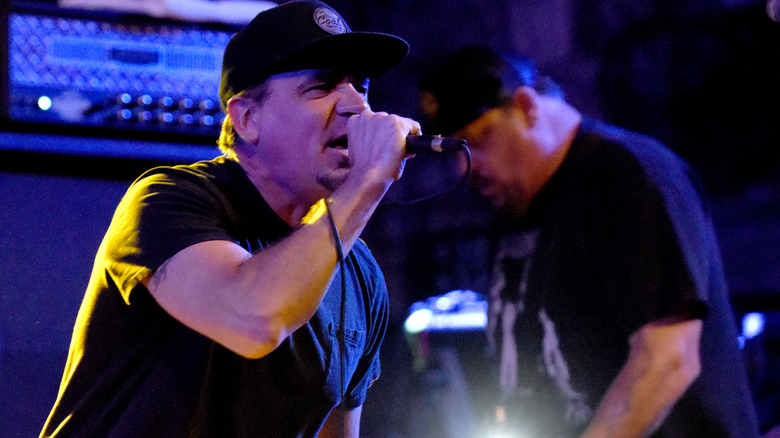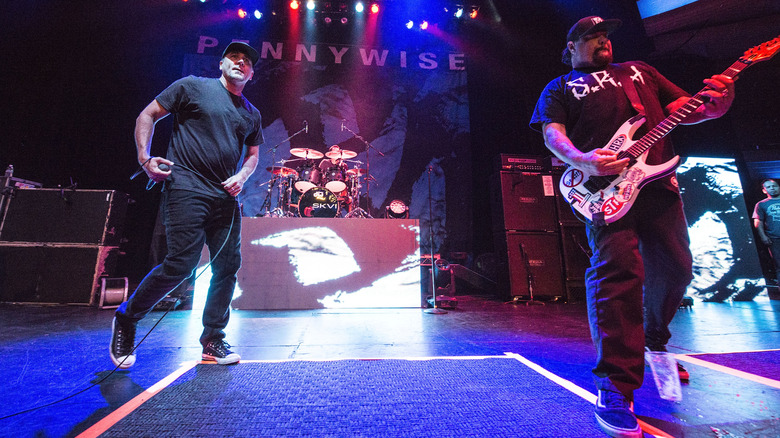Tragic Details About Pennywise
There's no denying that punk has a certain vibe, but when Pennywise was gearing up to make some serious waves in the music scene of the 1980s, they wanted to go in a different direction. Singer Jim Lindberg explained to the Albuquerque Journal, "The punk scene had become really cynical and confused ... the only bands that were doing anything inspiring were the ones singing about positivity and unity and heading in a new direction."
By the time he gave that interview, Pennywise had been together — off and on, and in various forms — for more than 25 years. The positivity, Lindberg says, really started with original bassist Jason Thirsk — and since his tragic passing, the rest of the band has kept his legacy alive by not only remembering him and his contributions, but holding onto the message that he wanted to spread.
Lindberg called it PMA — or Positive Mental Attitude. While that might sound a little strange when it comes to talking about a group with a major hit called "F*** Authority," there is — as is often the case — more to the story than just the titles in a discography. Lindberg adds that part of the mental attitude is getting in the mindset to do what it takes to make the world a better place, and there's a little bit of anger there, too. Look back at the history of the group and each individual member, and it turns out that they have a lot to be angry about.
Fletcher Dragge's brother died young
In 2009, Pennywise guitarist Fletcher Dragge announced some heartbreaking news: His 39-year-old brother, Kristian, had passed away. His death came just one month after the birth of his daughter, and along with the announcement, Dragge also said that they had set up a trust fund for little Avery Nycole. Donations, he said, were much appreciated.
The cause of death wasn't readily available, but Dragge's statement (via Sputnik Music) included this tribute: "He was a legend in the punk rock community and was well known for his hell-raising antics, along with his fierce loyalty to friends and family. He will be greatly missed by everyone. He has been a huge part of the Pennywise family since Day One."
Dragge has continued to carry the memory of his brother with him. It's no secret that Dragge is covered in tattoos, and in 2013, he spoke with OC Weekly about the meaning of some of them. They include three sets of initials on one arm: KSD for his brother, OJD for their father, and JMT for bass player Jason Matthew Thirsk. Dragge explained: "This arm is kind of a daily reminder of people who are special to me."
The tragedy of Bro Hymn
The song "Bro Hymn" is arguably one of Pennywise's most famous, and it also has an extremely heavy story that — over the years — has just gotten heavier. According to Lyrics, the song was written by then-bassist Jason Thirsk as a tribute to three friends he had lost: Tim Colvin, Carlos Canton, and Tom Nichols.
After Thirsk's death in 1996 (via MTV), Pennywise re-recorded the song for their new album. It was slightly retitled as "Bro Hymn (Tribute)," and joining in on the recording was Thirsk's brother, Justin. Singer Jim Lindberg later explained to Easy Reader News, "It just seemed that this was the right thing to do: Take this song that [Jason] wrote about friends,... take those exact sentiments and use them for his passing."
What ended up happening wasn't just healing among band members: When Acclaim took a look at the song's official video on YouTube, they noticed that the comments were almost universally empathetic. The appeal of the song proved to be lasting, and in 2018, Fletcher Dragge talked to Wall of Sound about how they had found it resonated with fans who had also suffered loss. Dragge told the story of a fan who had to leave a previous show when he got the news that his brother had passed away. Pennywise played again, and Dragge said, "...he was able to come to the show... and get up there on stage and sing "Bro Hymn" for his brother. .. Stuff like that is really touching."
They had to deny an association with white supremacists
In 1995, the Los Angeles Times did a piece that looked at Pennywise as a bit of a different beast in the world of punk: Rather than tearing everything down, their lyrics looked to build people up. Singer Jim Lindberg was candid about the consequences of their message, saying that he was well aware of the fact that it made them "an easy target for cynics."
Lindberg also spoke about how devastated he had been when Pennywise was adopted by white supremacist groups who had decided that since their name had both a "p" and a "w," they were a white power group. The association started almost immediately, and when they began performing after the release of their first album, they found concerts turning into drunken, violent brawls.
A reputation soon followed, and Lindberg said it made him question everything he was doing — especially when it kept happening, with him saying, "I took a look at myself and said, 'What am I doing here? I have such an aversion for this type of behavior, violence, and hatemongering, and I'm stuck in the middle of it as if I'm the spokesperson for it.'" It became such a frequent occurrence that Lindberg cited it as one of the reasons he left the group.
The animosity behind the departure of Jim Lindberg
In 2009, longtime lead singer Jim Lindberg announced that he was going to be leaving the group in order to spend more time with his family, including his three daughters. Pennywise replaced him and continued on, but interviews — from Lindberg and the other members — reveal there was a lot more going on behind the scenes.
Lindberg told Straight that his decision was also made because of a lack of communication among band members, and a failure on the part of child-free members to understand what he was going through. But when he was replaced, he wasn't happy about that, either: "It's one thing if they wanted to start another band and play new music," he explained. "But to put a hat on a guy and pretend that he was me, to have him singing songs about friends of mine who have passed away — well, all the authenticity is gone."
Dying Scene did a massive interview with Fletcher Dragge, and for a good amount of it, Dragge was condemning Lindberg and both his decision to leave... and the work he did before he left. He cited, too, a lack of communication, but blamed that on a desire to keep everyone happy and in the band: "You don't want the guy to quit because he's the frontman of the band, so you're walking on eggshells. You're scared. Once he was gone, it was like freedom. It was scary, but it was total liberation."
Jason Thirsk's death
In 1999, MTV reported that on July 29, Jason Thirsk's girlfriend had discovered his body in the backyard of his home in Hermosa Beach, California. The official cause of death was a self-inflicted gunshot wound, and according to the release by Epitaph Records, his death was ruled accidental, with police investigating it as a possible suicide (via the Honolulu Star-Bulletin).
In the years since, Pennywise has been candid about how his death impacted them on a personal and professional level. Jim Lindberg explained to the Daily Breeze, "Jason was always the emotional core of the band. It was a real tragedy for us when we lost him. We all felt kind of rudderless after that."
In addition to re-recording "Bro Hymn" as a tribute song, Easy Reader News says that the band — and those who knew Thirsk — continue to honor him in an annual memorial on the anniversary of his death. Thirsk — who had, at the request of the other band members, been on hiatus from the group to deal with alcohol addiction — is still memorialized at a gathering on Hermosa Beach every year. His father explained what it would have meant: "Jason would've appreciated it; he probably wouldn't have expected it. He really didn't think of himself as anything special, even though he was."
Zoli Teglas's collapse and emergency surgery
There's nothing quite like back pain to bring things to a grinding halt, and in 2012, that's exactly what happened to Pennywise singer Zoli Teglas. According to Loudwire, Teglas had been dealing with the pain of a herniated disc for some time. (That, says the American Association of Neurological Surgeons, is when one of the discs that cushion the bones of the spine rupture or slip out of place.)
Pennywise was performing at the Full Force Festival when Teglas collapsed onstage, and was ultimately rushed to the hospital. While herniated discs are common, typically have mild symptoms that gradually improve, and can often be treated with a little rest and some anti-inflammatory medications, Teglas's case was so severe that doctors rushed him into emergency surgery. It was determined that waiting would mean he risked being permanently paralyzed.
Three weeks later, The Music reported that Pennywise had canceled shows to allow Teglas the chance to recover. As for him, he was pretty bummed: "I can't really jump around or stage dive or nothing, because I got back surgery three weeks ago. ... I just got started walking about a week ago, so it'll be interesting."
Chester Bennington's death hit them incredibly hard
Two months after paying tribute to his good friend Chris Cornell, Linkin Park frontman Chester Bennington died by suicide. According to Rolling Stone, Bennington had been in and out of rehab, and, a month before he died, had texted a friend what was described as "an hour-by-hour battle with addiction."
Bennington's 2017 death hit the music world hard, and it hit Pennywise hard, too — especially Fletcher Dragge. Dragge spoke with Hysteria Magazine late in the year, on the heels of the release of their album "Full Circle." The album — which dealt with loss and mental health — was timely. Dragge, it turned out, lived not far from Bennington and saw him just a few weeks before his death. "He was happy as could be, you know. Super cool dude," Dragge described him. He went on to say that in hindsight, he saw the same thing in Bennington's songs and writing that he saw in former bandmate Jason Thirsk's — "a pattern of a cry for help."
Dragge was candid about how much it impacted him, knowing that they were friends, that they hung out, and that his number was in Bennington's phone when he died. "I've just been thinking, 'F***, why didn't he call me?' You know, why didn't he just f****** call me and say, 'Hey, let's get dinner' or something. He didn't call me because he was hurting and he couldn't take the pain anymore. That's why he didn't call anybody."
If you or anyone you know is having suicidal thoughts, please call the National Suicide Prevention Lifeline by dialing 988 or by calling 1-800-273-TALK (8255).
Brad Nowell's death hit them hard, too
Brad Nowell (center) never got to see the success of Sublime: According to Rolling Stone, his death came just two months before the release of the album that would make them a household name. His death — from a heroin overdose — came 11 months after his son's birth; months later, his father was still receiving fan mail from those who didn't know he had passed.
It was another loss that hit Pennywise hard: According to The Intelligencer, Pennywise had gotten an advance copy of Sublime's debut album, and absolutely loved it — so much so that they had invited the up-and-comers to tour Europe with them in 1996. Unfortunately, Nowell's death happened the day before that tour was supposed to start.
"I remember waiting in Germany, wondering if Sublime's flight landed," Fletcher Dragge recalled. "They were late for sound check. And then I heard that Bradley passed away." That conversation happened in 2013, when Pennywise was finally heading out on tour with Sublime With Rome, the next incarnation of the band. Prior to that, the group was active in lending a helping hand to the family that Nowell left behind. In 1997, MTV reported on a benefit concert for Nowell's 19-month-old son (headlined by Pennywise and No Doubt), and in 1998, they participated in the filming and release of the Sublime documentary "Stories, Tales, Lies, and Exaggerations."
If you or anyone you know is struggling with addiction issues, help is available. Visit the Substance Abuse and Mental Health Services Administration website or contact SAMHSA's National Helpline at 1-800-662-HELP (4357).
Revisiting the past put the life of a star in perspective
In 2011, Complex spoke to Jim Lindberg about going from punk rocker to the father of three daughters — and balancing the two seemingly at-odds parts of his life. Sadly, he said that he was well aware that many of his evolving views made him a target for being condemned as a hypocrite.
"There's plenty of people who've seen me on the wrong end of a bar stool over the years that would cry foul..., but at the same time, I think some people get into [drugs and alcohol] way too early. ... I'm sure everyone out there has seen that drugs and alcohol can really destroy people's lives." He's made sure to teach his daughters that, he says, adding that contrary to what some might preach, it's not glamorous to die young — especially from the complications of addiction.
Just a few years later, Lindberg reconciled with Pennywise, and in 2014, he spoke with the Daily Breeze about going back to the studio. Seven songs on their new album were from the late 1980s, with most of the lyrics written by Jason Thirsk. It was bittersweet: By the time they were recorded, Thirsk had been gone almost 20 years. He described it as going back to a time when things were simpler — and when their friend was still there: "It's so great for me to get back to his early music, because it's really a reconnection with Jason... We were just a bunch of surf kids."
Jim Lindberg has been candid about the realities of the punk rock life
Pennywise singer Jim Lindberg has shared a lot about what goes on behind the scenes of a successful music career. When Complex talked to him around the release of the punk film "The Other F Word," he had plenty to say that could be used as a cautionary tale for anyone wanting a career in music.
It's not all it's cracked up to be, he shared, and it's certainly not just getting on stage and having fun — not, that is, unless someone wants to end up in a body bag. "The glamorous side of punk rock is the Sid Vicious ending to the story, and you die somewhere a drug addict, live fast, die young. No one wants to end up like Sid Vicious."
He knows — he's seen it happen to friends. He's also been candid about what it takes to make a band successful. There's a lot of tour bookings, van rentals, logistical nightmares, and budgeting that needs to be done, too, and he says that it's a shame that more people don't go into it knowing what they're in for. That includes the nightmares of touring: While it might sound like a great time, getting to see the world, it's more accurately seeing three to four airports a week, flying economy class, and renting vans and buses. And then, when you're a decade in? Lindberg summed it up like this: "The back end of any career isn't as fun."
Pedro the Dog
Here's a heartbreaking one for all animal lovers: Be warned, this one isn't going to have a happy ending.
Pennywise's Fletcher Dragge is covered in tattoos, and most of them have a story. The one he regrets the most is the one he told OC Weekly was "probably one of the dumbest things I've ever done," and it's the line of stitches that runs all the way from the end of his middle finger to his chest.
There's one that's even sadder. Dragge says that one night — after a few too many drinks — he and a buddy decided that they were going to tattoo each other. His friend tattooed a dog's face on him, while the friend got an absolutely cliché "Born Free" tattoo. The dog in question was his buddy's dog Pedro, and the next day, his unnamed friend took Pedro for a walk. Unfortunately, he had the terrible habit of not using a leash: The dog ran into the street, was hit by a car, and killed. "So literally five hours after getting the tattoo," Dragge says, "he was gone."
